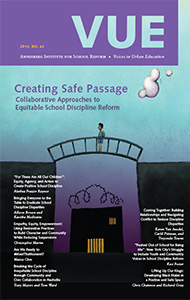Ending identity-based discipline disparities will require transformative partnerships that focus on both school-level and systems-level change.
Creating Safe Passage: Collaborative Approaches to Equitable School Discipline Reform

Efforts to address school discipline disparities throughout the country are being led by a broad range of stakeholders – including community organizers, nonprofits, advocates, district leaders, teachers’ unions, researchers, funders, legislators, and other groups. Bringing these stakeholders together to examine identity-based disparities, exclusionary policies, and punitive practices – and to work collaboratively toward designing interventions – has the great potential to create positive and healthy school climates where all students can find “safe passage” from early childhood to young adulthood.
Representatives from Open Society Foundations and The Atlantic Philanthropies discuss philanthropy’s role in school discipline reform.
A middle school science teacher in Denver, Colorado, finds success using restorative approaches that focus on empathy rather than punitive zero-tolerance school discipline policies.
A community-based organization frames its collaboration with multiple stakeholders around changing from a “culture of discipline” to a “culture of dignity” within the Los Angeles district.
In Nashville, the school district has partnered with law enforcement, juvenile justice, community organizations, parents, and students in efforts to tackle inequitable disciplinary practices.
Partners from Chicago Public Schools and local education organizing groups share their experiences with the PASSAGE initiative.
An education organizer in New York City argues that the lived experiences of students must be placed at the center of strategies aimed at ending systems of inequitable discipline policies.
An innovative program in California’s Oakland School District focuses on changing the narrative about young African American males in order to radically change the outcome of their lives.





